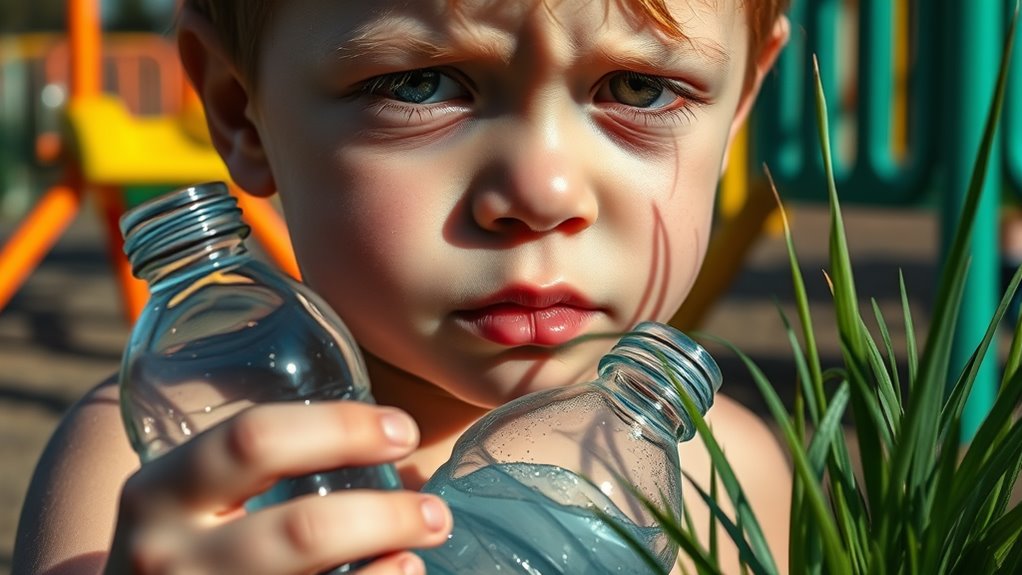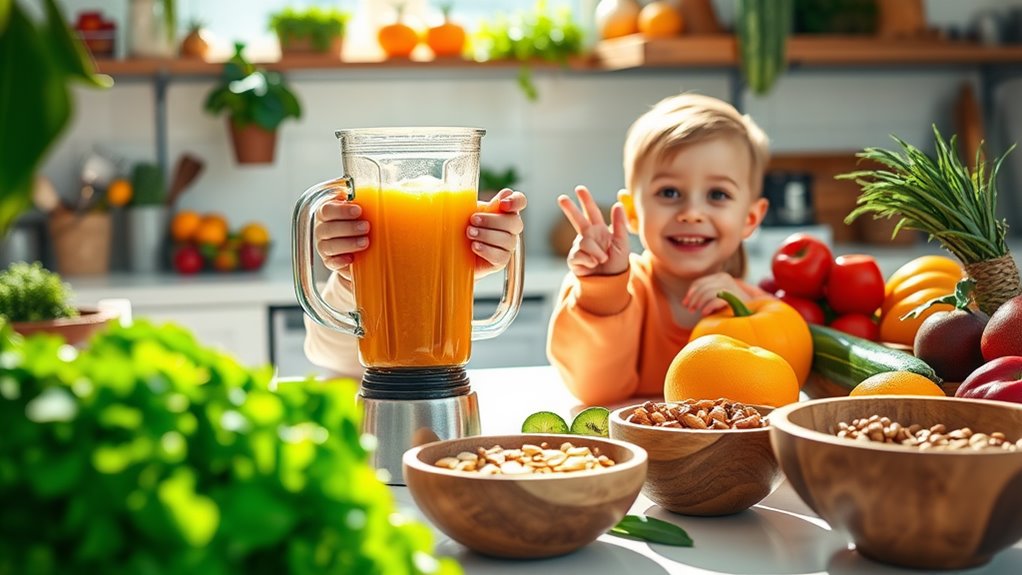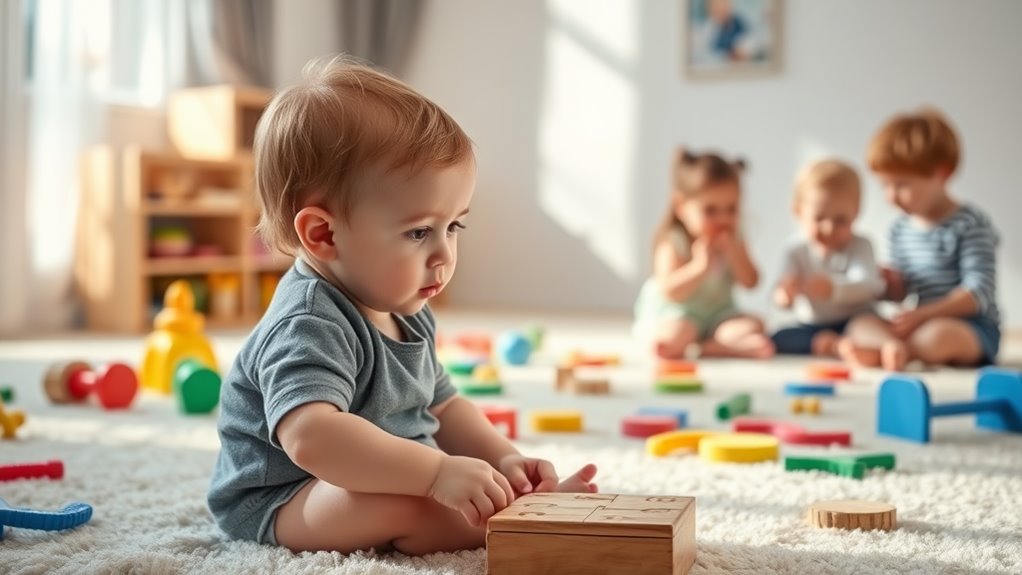The Effects of Dehydration on Children’s Health
You might not realize how vital hydration is for your child’s health, especially since it goes beyond just quenching thirst. Dehydration can lead to a range of issues, from fatigue and irritability to more serious long-term consequences that could affect their growth and development. It’s important to recognize the signs and understand the risks involved. What are the specific symptoms you should watch for, and how can you make sure your child stays properly hydrated? The answers could be more important than you think.
Understanding Dehydration
When it comes to children’s health, understanding dehydration is essential for every parent. Dehydration happens when your child loses more fluids than they take in. Think of it like a plant that hasn’t been watered; it starts to droop and look sad, right? Your little one needs water to keep everything running smoothly, from digestion to energy levels.
Kids are especially susceptible to dehydration because they’re often busy playing, running around, and forgetting to drink. You might notice they’re not as peppy as usual or they’re complaining of headaches. These can be signs that they need a good drink.
So, how can you help? Encourage them to sip water throughout the day, especially during hot weather or after playing sports.
You don’t need to turn hydration into a science project; just make it fun! Fill a colorful water bottle or let them choose a silly straw. Remind them that even superheroes need to drink water to stay strong.
Causes of Dehydration
Dehydration can sneak up on kids for several reasons, making it essential for parents to stay vigilant.
First off, kids are often so busy playing that they forget to drink water. You know how it goes—they’re having fun, and suddenly, hours have passed without a sip!
Also, when it’s hot outside, they’re sweating more than usual, which means they need extra fluids to keep up.
Illness can also play a part, especially if your child has a fever, diarrhea, or vomiting. These situations can drain their bodies of water faster than a leaky faucet!
Even certain activities, like swimming, can lead to dehydration since they mightn’t think to hydrate while splashing around.
Let’s not forget that some kids may not like the taste of plain water. They might prefer juice or soda, but those aren’t as effective in keeping them hydrated.
So, it’s up to you to encourage them to choose water more often, and make it a fun habit!
Symptoms to Watch For
Recognizing the symptoms of dehydration early can make a significant difference in your child’s health. Keep an eye out for signs that your little one mightn’t be getting enough fluids. If they’re feeling extra tired, cranky, or just not themselves, it could be a hint that they need a drink. Thirst is a big red flag, so if they’re constantly asking for water, don’t ignore it!
Look for dry mouth or sticky lips; these are often telltale signs. If you notice they’re not peeing as much as usual or their urine is darker than normal, that’s another clue. Kids should be using the bathroom frequently, so any changes here can raise a warning flag.
Also, check for a lack of tears when they cry. If they’re not producing tears, it’s time to hydrate!
Finally, if your child feels unusually dizzy or lightheaded, act fast.
Risks for Children’s Health
Several risks can threaten your child’s health if dehydration goes unnoticed. First off, their bodies need water to function properly. When they’re dehydrated, they can feel tired, cranky, and even dizzy.
You might notice your little one is less active than usual, which can be a sign that they need a drink. Dehydration can also lead to headaches, and nobody likes a grumpy kid with a headache!
It can mess with their concentration, making it harder for them to focus in school or while playing. If your child is involved in sports, dehydration can slow them down, making them more prone to injuries.
In severe cases, dehydration can lead to more serious health issues, like kidney stones or urinary tract infections. And trust me, you don’t want to deal with those!
Long-term Effects
Ignoring dehydration can lead to some troubling long-term effects on your child’s health. If your little one doesn’t drink enough water regularly, it might slow down their growth and development. That’s right! Your child could end up being a bit shorter than they could have been, all because they didn’t sip enough H2O.
But wait, there’s more! Dehydration can mess with your child’s concentration and memory. Imagine trying to focus in class while your brain feels like a dried-up sponge. Not fun, right?
Plus, chronic dehydration can lead to kidney problems later in life. That’s like a ticking time bomb for their health.
You might think, “Oh, they’re just kids!” But these issues can sneak up on you. The longer your child stays dehydrated, the more serious these effects can become.
So, encourage them to drink up! It’s not just about quenching thirst; it’s about keeping their bodies and minds working like a well-oiled machine.
Importance of Hydration
Hydration is essential for your child’s overall health and well-being. When your child drinks enough water, they feel energized, focused, and ready to tackle the day. Water plays a vital role in many body functions, like regulating temperature, aiding digestion, and flushing out toxins.
Think of it as the oil that keeps the engine running smoothly!
Without enough hydration, your child might feel tired, cranky, or even have trouble thinking clearly. You wouldn’t want a car running low on gas, right? The same goes for your little one!
Plus, staying hydrated can help prevent things like headaches and constipation, which nobody enjoys.
Encouraging your child to drink water throughout the day is a smart move. You can make it fun by adding slices of fruit to their water or giving them a cool water bottle they love.
A little creativity goes a long way!
Prevention Strategies
To keep dehydration at bay, it’s important to incorporate simple habits into your child’s daily routine. First off, make water the go-to drink at meals and during snack time. You can even jazz it up with slices of fruit or a splash of juice—kids love making their drinks look fun!
Encourage your child to carry a reusable water bottle. This way, they’ll have water handy during school, sports, or playdates. You might even set a reminder for them to take a sip every hour. Trust me, it’ll become a habit before you know it!
Also, pay attention to the weather. On hot days, remind your child to drink more water, and maybe even plan some indoor activities during peak sun hours.
And don’t forget about foods! Fruits and veggies have high water content, so snacks like watermelon or cucumber can help keep hydration levels up.
Lastly, make hydration a family affair. Join your child in drinking water and enjoying healthy snacks together. This way, you’re not just teaching them; you’re having fun and staying healthy as a team!
Treatment Options
Even with the best prevention strategies in place, children can still experience dehydration. If that happens, it’s important to act quickly!
First, start by giving your child fluids. Water is great, but if they’re really dehydrated, you might want to grab some oral rehydration solutions, which you can find at most stores. These drinks have the right balance of salts and sugars to help get their body back on track.
Encourage your kiddo to sip slowly—chugging it down can make them feel sick. If they’re feeling up to it, some clear broths or soups can also do the trick. Just think of it as a warm hug in a bowl!
In more serious cases, like if your child’s showing signs of severe dehydration, it’s time to call a doctor or head to the emergency room. They might need IV fluids, which sounds scary, but it helps them feel better faster.
Hydration Tips for Parents
Keeping your child well-hydrated is essential for their health, especially during hot weather or when they’re active.
So, how can you guarantee they drink enough? First, make water fun! Get a colorful water bottle that your child loves. Encourage them to decorate it with stickers or drawings. Who knew hydration could be stylish?
Next, set a routine. Remind your child to drink water after playtime, during meals, and before bed. You can even use a timer or an app to make it a game.
Speaking of games, turn hydration into a challenge! See who can drink the most water in a week. A little friendly competition never hurt anyone!
Offer more than just plain water. Try adding slices of fruit or herbs to make it flavorful. Your child might love lemon-infused water or minty cucumber water. It’s like a spa day in a bottle!
Lastly, lead by example. If your child sees you drinking water regularly, they’re more likely to do the same.




